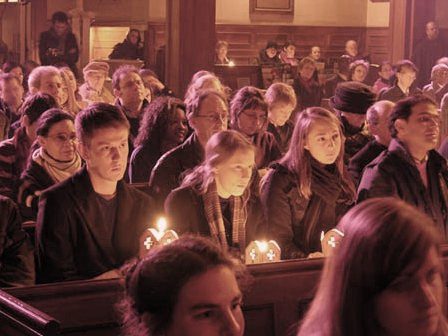This January 18-25, churches worldwide will participate in “Eight Days reflecting on our change in Christ.” It is called the World Week of Prayer for Christian Unity.
Why do most American churches ignore the annual event which began in 1908? Perhaps it is because it is co-sponsored by the World Council of Churches. The vast majority of U.S.churches shun having anything to do with the WCC – and have for decades.

It’s always a real shame when a great idea is shrugged off – particularly since the Week of Prayer isn’t “owned” by the WCC. This year’s official text was approved jointly by the Faith and Order Commission World Council of Churches in Geneva, Switzerland, and the Vatican’s Pontifical Council for Promoting Christian Unity in Rome.
But it’s as if your family’s black sheep, Aunt Libby, announces she’s going to celebrate your grandparents’ 48th wedding anniversary with a grand gala. Your mom rolls her eyes and says she’ll take them out to dinner the night before, but will skip Libby’s party since she really needs to stay home to shampoo the rug.
The World Week of Prayer actually was founded by two English clergymen, one Catholic, one Church of England. It gained popularity in the 1930s when it was promoted by a French clergyman.
This year, participants are “invited to enter more deeply into our faith that we will all be changed through the victory of our Lord Jesus Christ. The biblical readings, commentaries, prayers and questions for reflection, all explore different aspects of what this means for the lives of Christians and their unity with one another, in and for today’s world.”
For eight days, participants are invited to consider chosen scriptures and a daily theme, which include:
Day One: Changed by the Servant Christ
Day Two: Changed through patient waiting for the Lord
Day Three: Changed by the Suffering Servant
Day Four: Changed by the Lord’s Victory over Evil
Day Five: Changed by the peace of the Risen Lord
Day Six: Changed by God’s Steadfast Love
Day Seven: Changed by the Good Shepherd
Day Eight: United in the Reign of Christ
Participants consider tenets of faith shared by all Christians, such as: “Christ’s victory enables us to look into the future with hope. This victory overcomes all that keeps us from sharing fullness of life with him and with each other. Christians know that unity among us is above all a gift of God. It is a share in Christ’s glorious victory over all that divides.”
So, there no little irony in that the World Council of Churches’ involvement seems to make the event of little interest to most of America’s largest churches.
WCC membership includes almost no conservative Evangelicals. The WCC’s U.S. organization, the National Council of Churches, is dominated byAmerica’s five top liberal and declining denominations: The Episcopal Church in the United States of America, the Presbyterian Church U.S.A., the Disciples of Christ, the Evangelical Lutheran Church in America, the United Church of Christ (Congregationalists) and the United Methodist Church. The Episcopalians alone have lost 1 million members since 1975. The Disciples had 2 million members in 1958 and now are less than half of that.
The Catholic Church declines to join the World Council of Churches. The Southern Baptists are particularly blunt in their assessment:
“The World Council of Churches has long been a boutique of paganism in Christian garb,” writes Russell D. Moore, senior vice president for academic administration and dean of the school of theology at Southern Baptist Theological Seminary in Louisville,Ky. “Believers across the world, whatever their denomination or communion, recognize the spirit of the World Council for what it is: the spirit of antichrist.”

One of the great leaders of the Pentecostal/ Charismatic movement, South African author David du Plessis, was disfellowshiped from the Assemblies of God denomination for his determination to maintain a dialogue with the World Council of Churches, which was seen as too flawed to ever succeed.
During the Cold War, it was alleged to be a target of the KGB, which — Continued on page 2


